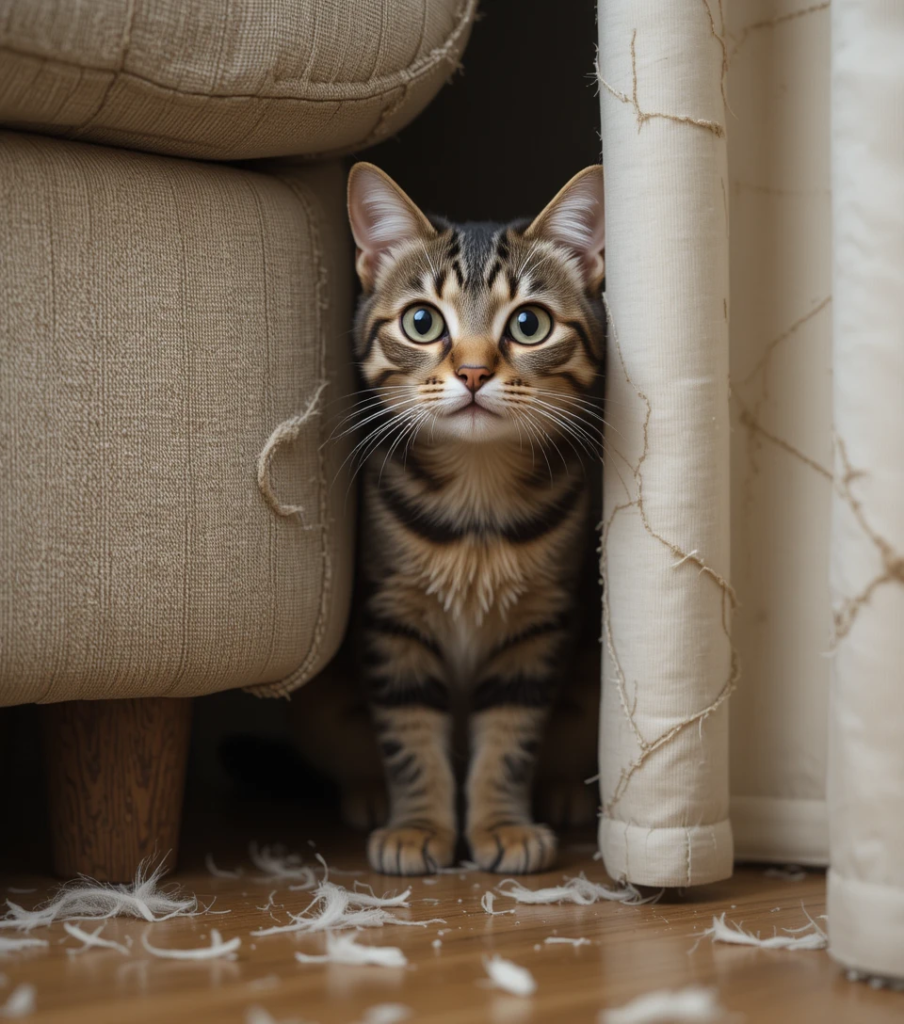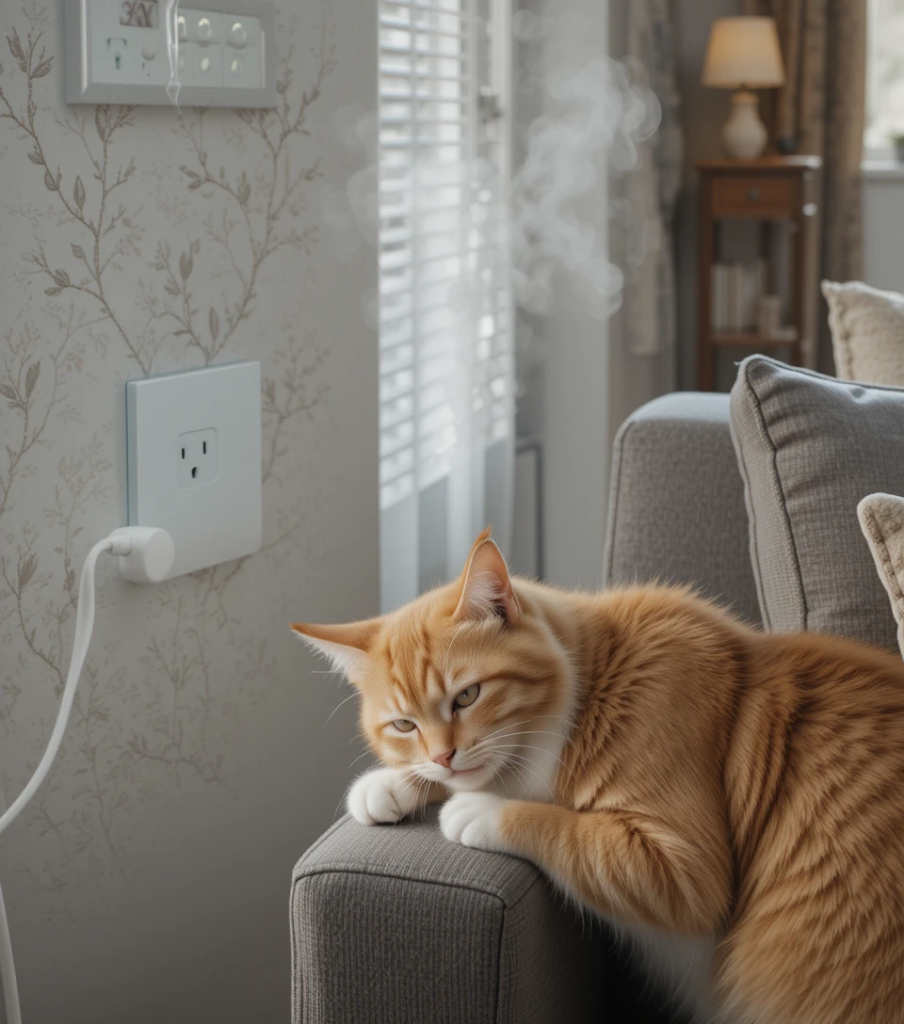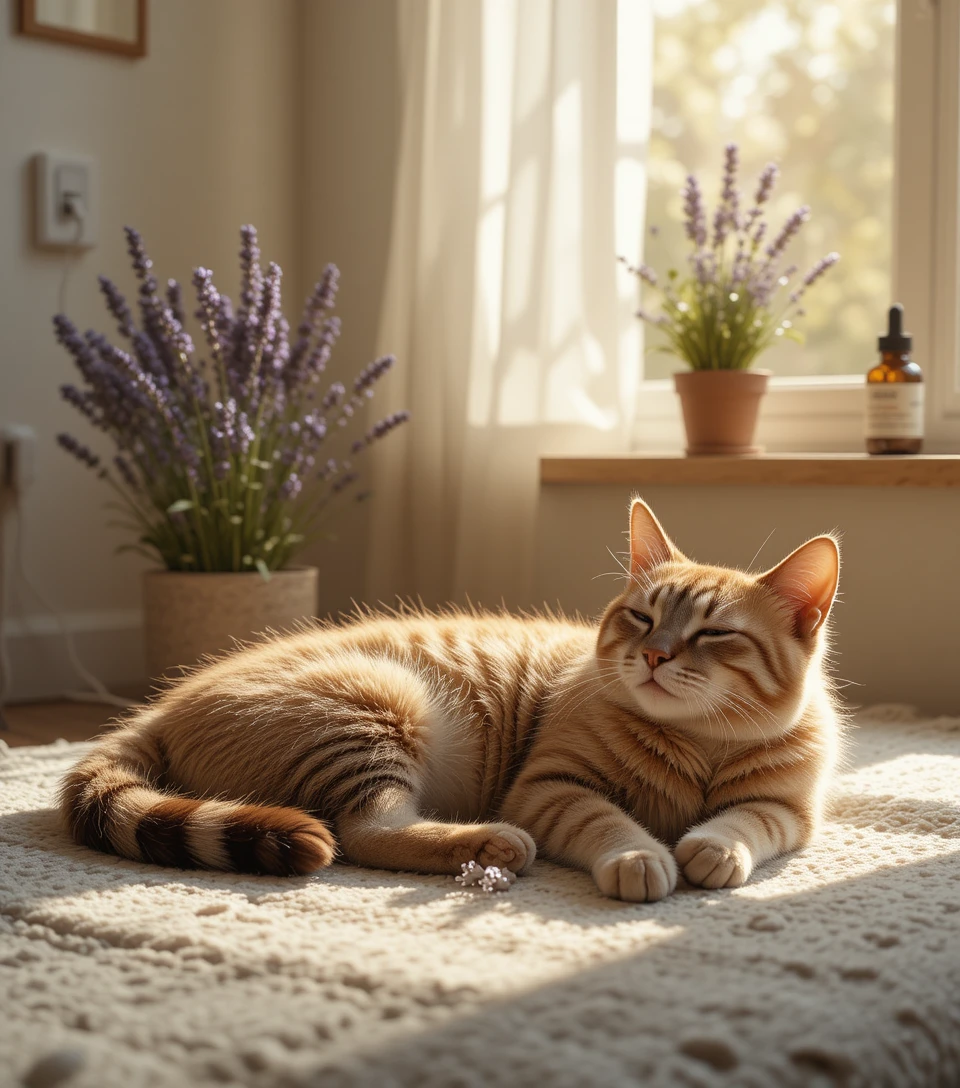Introduction
Cats are creatures of habit—sensitive to change, loud noises, and even subtle shifts in their environment. But when their anxiety goes unnoticed, it can turn into chronic stress that affects their health and behavior.
The good news? You don’t always need prescription medications to help your cat feel safe and relaxed. Backed by science and embraced by holistic veterinarians, natural remedies offer powerful, gentle relief for anxious cats—without the side effects.
Let’s explore the most effective, research-supported ways to help your feline friend feel calm and secure—naturally.
1. What Does Cat Anxiety Look Like?

Anxious cats don’t always meow for help. Instead, they may show subtle signs that are often misunderstood as “bad behavior.”
Common signs of anxiety in cats:
- Hiding or avoiding interaction
- Aggressive behavior toward people or other pets
- Excessive grooming or hair loss
- Peeing outside the litter box
- Destructive scratching
- Restlessness or over-vigilance
Common triggers:
- Loud noises (e.g., fireworks, thunderstorms)
- Changes in the home (new pet, moving, visitors)
- Trips to the vet or groomer
- Lack of stimulation (especially in indoor-only cats)
Recognizing these signs early is the first step in choosing the right natural remedy.
2. Why Use Natural Remedies?
Natural remedies for cat anxiety are gaining popularity—and for good reason. When used correctly, they can:
- Reduce stress without sedation
- Support long-term emotional balance
- Avoid side effects linked to pharmaceuticals
- Fit into a holistic or preventive health approach
Veterinary behaviorists and holistic vets often recommend starting with natural options before considering medication—especially for mild to moderate anxiety.
3. Herbal Solutions with Real Effects
Herbs have been used for centuries to calm both humans and animals. Recent research supports their role in reducing feline anxiety—safely and effectively.
🌿 Top Natural Calming Herbs for Cats:
- Valerian Root
Known for its mild sedative effect, valerian helps soothe nervous cats and may reduce aggression triggered by fear. - Chamomile
Anti-inflammatory and calming, chamomile can help cats relax—but should only be given in small, vet-approved doses. - L-Theanine
An amino acid found in green tea, L-theanine supports relaxation and improves focus—without causing drowsiness. - CBD Oil (Vet-Formulated)
Derived from hemp (non-psychoactive), CBD is showing promise in reducing feline stress. Only use CBD products made for pets, and consult your vet first.
4. Pheromone Therapy (Science-Backed Calm)

One of the most scientifically supported natural solutions is pheromone therapy.
💡 What is it?
Products like Feliway mimic the facial pheromones cats naturally produce when they feel safe. When diffused into the environment, these synthetic pheromones help cats feel at ease.
✔️ Proven Benefits:
- Reduces stress during travel or vet visits
- Helps prevent territorial behavior
- Promotes peace in multi-cat households
Studies have shown that pheromone diffusers can lower cortisol levels and calm anxious behaviors within days.
5. Essential Oils: What’s Safe, What’s Not
Essential oils are powerful—but when it comes to cats, extreme caution is needed. Cats lack the liver enzyme to process many compounds found in oils, making some toxic.
✅ Safe (in diluted form and with vet approval):
- Lavender
- Frankincense
- Cedarwood (non-toxic variety)
❌ Unsafe and toxic to cats:
- Tea tree
- Eucalyptus
- Citrus oils
- Peppermint
Never apply essential oils directly to your cat. Use diffusers only in well-ventilated rooms, and always allow your cat to leave the area if they choose.
6. Environmental & Sensory Enrichment
Boredom is a major anxiety trigger—especially for indoor cats. Enriching their environment with safe, stimulating spaces helps relieve stress and restore a sense of control.
🏡 Enrichment Ideas:
- Window perches or cat shelves
- Hiding spots and cat caves
- Scratching posts and cat trees
- Puzzle feeders and treat balls
- Interactive play sessions (feathers, lasers)
Keeping your cat physically and mentally engaged reduces anxiety and increases overall happiness.
7. Sound Therapy and Music for Cats
Did you know cats respond to music designed just for them?
🎶 Calming sounds backed by science:
- Low-frequency, slow-tempo music
- Instrumentals mimicking purring or suckling sounds
- Streaming apps and playlists made for cats (like “Music for Cats”)
Studies show that cats exposed to soothing sounds experience slower heart rates and improved behavior—especially in stressful settings like vet clinics.
8. Training and Desensitization
Natural remedies work best when paired with behavioral conditioning.
🐾 Key tips:
- Stick to a predictable routine (feeding, play, sleep)
- Gradually expose your cat to mild versions of stressors
- Reward calm behavior with treats and affection
- Use positive reinforcement—not punishment
Over time, your cat will associate once-scary situations with safety and calm.
9. When Natural Isn’t Enough
While natural remedies can do wonders, some cats experience severe anxiety that requires medical support.
When to see a vet:
- Self-harming or compulsive behavior
- Chronic aggression or elimination issues
- Anxiety worsens despite trying natural solutions
A veterinary behaviorist may recommend anti-anxiety medications or a combined approach with natural supplements for best results.
Conclusion
Anxiety is a real, treatable condition in cats—and the natural world offers powerful tools to help. From calming herbs and pheromone therapy to music and enrichment, there are science-backed ways to help your feline companion feel safe, relaxed, and happy.
Start small, observe carefully, and always consult your vet when in doubt. A calmer, more confident cat is within reach—naturally.
🙋♀️ 10 FAQs About Natural Remedies for Cat Anxiety
1. What are the most effective natural remedies for cat anxiety?
Valerian root, chamomile, L-theanine, pheromone diffusers, and enrichment strategies are among the most effective options.
2. Can I give my cat valerian or chamomile safely?
Yes, but only in pet-safe formulations and under your vet’s guidance. Overdoses can cause side effects.
3. Is CBD oil really safe for cats?
Vet-formulated CBD oil may help, but quality matters. Always check for third-party testing and consult a vet first.
4. How do pheromone diffusers like Feliway work?
They mimic natural feline pheromones, signaling comfort and safety to your cat’s brain.
5. Are essential oils safe to use around cats?
Only some, and only when diluted and diffused safely. Direct contact or strong scents can be harmful.
6. How can I tell if my cat is anxious?
Look for hiding, over-grooming, aggression, or changes in litter box behavior.
7. Do natural calming products really work?
Yes—especially when combined with behavioral techniques and a stable routine.
8. Can music help calm cats?
Yes. Specially designed music can reduce stress and anxiety, particularly during vet visits or storms.
9. When should I call the vet about cat anxiety?
If your cat’s behavior becomes extreme, self-destructive, or unmanageable with home remedies.
10. Are natural remedies enough, or do some cats need meds?
Some cats with severe anxiety may need prescription meds in addition to natural support. Your vet can guide you.

